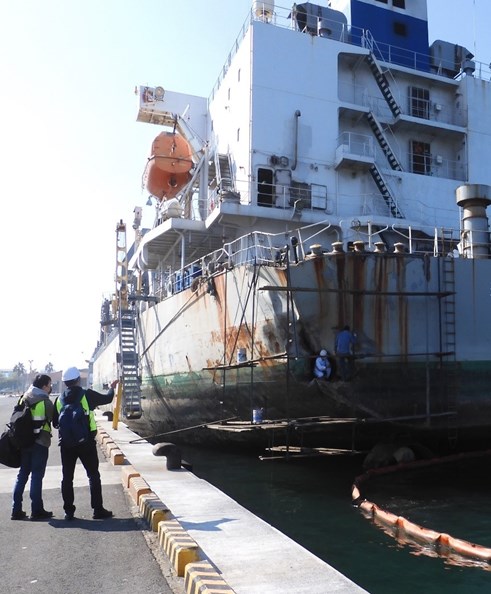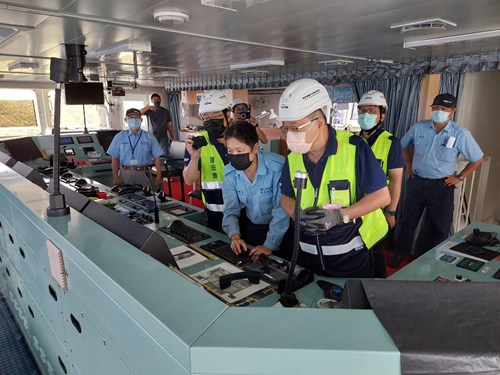Investigation Process
Who we are
The Taiwan Transportation Safety Board (TTSB) is an independent government agency responsible for transportation occurrence investigation and advances transportation safety by issuing safety recommendations. The objective of such investigation is to elevate the national transportation system safety, not to apportion blame or liability to any specific person or entity. The investigation report cannot be used as the sole evidence in the judicial process.
Scope of Major Marine Occurrence including civil and public ships. The ship is defined as a powered vehicle on the water surface or in the water for loading personnel or cargo. This includes passenger ships, cargo ships, fishing ships, special purpose ships, yachts, and boats but excludes military ships and non-passenger ships with a gross tonnage of less than 300. The Marine Occurrence Investigation Division conducts its safety investigation according to domestic law and regulations (such as the Transportation Occurrence Investigation Act, Scope of Major Transportation Occurrence, The Regulation Governing the Handling of Investigation Procedures for Marine Occurrence, and Acts promulgated by the supervisory authority of the Ministry of Transportation and Communications, etc.) and international protocols, (e.g. IMO Casualty Investigation Code).
Our methodology
The Marine Occurrence Investigation Division investigation process can be divided into five phases: response to notification, on-scene operation, factual data collection and verification, analysis, and final report review.
Response to Notification phase
The TTSB has on-duty officers responsible for processing the occurrence notifications 24/7. When a notification is received, and verified by the respective investigation division as an occurrence, a go-team would be dispatched by an investigator in charge (IIC) to the scene. For a suspected occurrence, an occurrence verification meeting would be convened after preliminary factual information is collected by the on-scène team The decision will be made according to the Transportation Occurrence Investigation Act and relevant international regulations.
On-Scene phase
The IIC organizes an investigation team of size based on the severity and complication of the occurrence. The mission of the go-team is to collect and secure on-scene evidence that could be easily vanished. For instance, paint remained on the hull after a collision, scene photos, data from voyage data recorder, crew alcohol test, and interviews. According to our Marine Occurrence Investigation Standard Operating Procedures, we have to inform the captain to download and secure the voyage data recorder of the occurrence ship as soon as possible once a suspect marine occurrence is reported.
In principle, the investigation team consists of different experts, such as the vessel operations group, vessel traffic service group, vessel system group, voyage data recorder group, human factors group, etc. TTSB investigators will act as the group chairman of each group, and professionals from other units, including Maritime Port Bureau, Fisheries Agency, Coast Guard Administration, Commercial Port Administrative Authority, pilot, shipowner, ship manager, and technical advisors, will act as group members.

Factual data collection and verification phase
The factual report includes all sorts of factual information, such as records of interviews, certificates of the vessel, vessel basic data, damage information of structural and equipment, paint sampling, and data from the voyage data recorder, etc. The results of simulations, tests, and studies carried out as requested by the investigation team are also part of the factual report. Each group must complete its own group factual report during the factual data collection phase, and the IIC will compile them into a factual report for the occurrence investigation. The report would be published after all involved parties jointly verifying of its content.
Analysis phase
Based on the factual information, the investigation team will independently conduct analyses of safety factors and probable causes before proposing safety recommendations to produce a draft final report. If necessary, the IIC may invite all relevant parties to conduct a technical review meeting and collect their comments about the draft final report. The draft final report would be amended if comments from parties are adopted. For any identified safety risk, the TTSB will coordinate with the involved parties to take all necessary actions immediately, and will not wait until the final report is published.

Final Report review phase
The draft final report will be sent to all relevant parties after TTSB Professional Review Board or TTSB Board Meeting. If the TTSB receives any comments within 30 days after the transmittal letter, those comments will be reviewed in the Board meeting and they will be amended into the draft final report as appropriate. The updated draft final report will be sent to all parties for comments and they may submit their intentions, within the next 15 days, to have an oral presentation regarding their comments in the next Board meeting. The Board Meeting will determine whether or not to accept the presented comments and amend them to the final report. The final report of the occurrence investigation will be published after all these procedures are complete. Parties also have the right to append their comments to the Final Report, when their comments are not accepted by the Board.